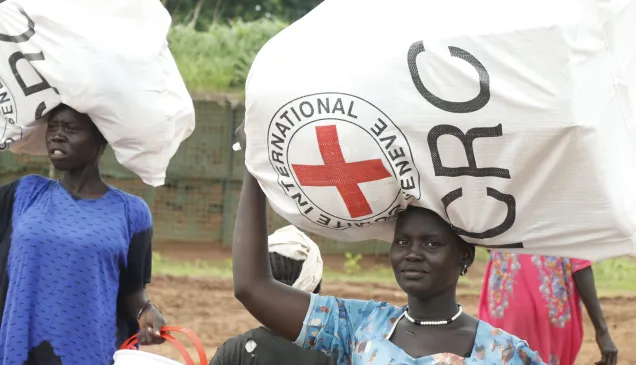First Review Conference of the Convention on Cluster Munitions Dubrovnik, Croatia, 7-11 September 2015.
Address by Christine Beerli, vice-president of the ICRC.
We must urge the remaining signatory States to ratify the Convention, and persuade other countries to join it at the earliest opportunity.
Five years ago, at the First Meeting of States Parties, the International Committee of the Red Cross (ICRC) hailed the Convention on Cluster Munitions, saying that it gave the international community the tools to put an end to decades of civilian suffering. That suffering is the pain and anguish of civilians who have lost their limbs, their family members and their livelihoods to a cluster munition detonation. And it is the strain on communities that continue to face the hidden dangers of cluster munition remnants.
Since then, the Convention has indeed proven to be an effective tool for alleviating the suffering of cluster munition victims and preventing future casualties. Ninety-five States now prohibit cluster munitions, and another 22 have supported the prohibition by signing the treaty.
Ninety per cent of the cluster munitions in States Parties' stockpiles – some 160 million submunitions – have already been destroyed. Contaminated land is being surveyed and cleared in a timely fashion, and determined efforts are being made to assist and rehabilitate cluster munition victims.
Clearly, we have reason to be pleased with the achievements of the past five years. Yet much remains to be done if we are to reach our common goal. That goal is, in the words of the Convention, to put an end for all time to the suffering and casualties caused by cluster munitions. This conference is a critical opportunity to consider the quickest and most effective way of doing this.
The dedicated work on stockpile destruction, clearance and victim assistance must continue. But the ICRC believes that particular efforts must be made in several other areas as well.
First, we must strive for universal adherence to the Convention. Much has been accomplished in recent years in promoting the Convention, particularly in urging signatory States to ratify. We commend the work of Costa Rica and Zambia – past presidents of the Meetings of States Parties – and that of Norway and Ecuador, which served as coordinators on universalization. Since the last Meeting of States Parties, six signatory States have ratified the Convention and three States have acceded to it. Now we need to redouble our efforts: we must urge the remaining signatory States to ratify the Convention, and we must persuade other countries to join it at the earliest opportunity.
Furthermore, we must ensure that States Parties remain on track to meet their clearance and stockpile destruction obligations. And if States need an extension, they must be prepared to file requests in a timely manner. For a number of them, these deadlines are fast approaching, particularly for the clearance of cluster munition remnants. As we have seen from other treaty processes, significant planning and preparation are needed, and these preparations must begin well in advance of deadlines, particularly when requesting an extension.
A third and vital challenge is maintaining the resources for the Convention's implementation. Without the necessary technical, financial and human resources, clearance deadlines cannot be met, victims do not receive or have access to assistance and stockpiles are not destroyed.
any use of cluster munitions by any party is unacceptable
Finally, if we are to put an end for all time to the suffering and casualties caused by cluster munitions, the stigmatization of these weapons must continue to be strengthened. In the ICRC's view, any use of cluster munitions by any party is unacceptable. In this respect, I am heartened by the condemnations and deep concern expressed by many States Parties about the use of cluster munitions in recent armed conflicts. The international community must never be complacent about the use of these weapons or their severe consequences in humanitarian terms.
Clearly, the effective implementation of the Convention requires a functioning Implementation Support Unit. We urge States Parties to take the necessary decisions so that the formal and informal work of the Convention can continue. In particular, we urge States Parties to adopt a funding model for the Implementation Support Unit that will allow it to play an effective role in advancing the Convention's goals and being a resource for States Parties in their implementation of the Convention.
The Dubrovnik Declaration and Dubrovnik Action Plan set out the commitments and the roadmap for making progress on many of these issues. As you consider these documents in the coming days, we urge States Parties to ensure that the commitments and actions are as clear and as strong as possible, and to work determinedly to fulfil them over the next five years.
>> See also: First Review Conference of the Convention on Cluster Munitions website



